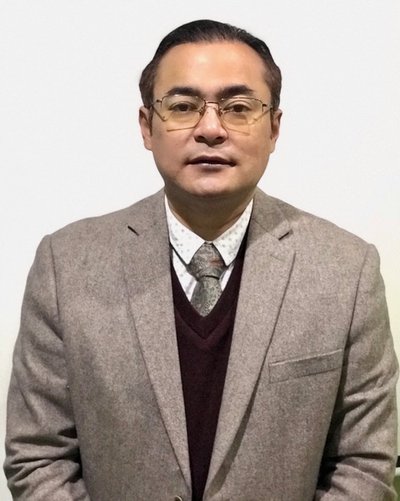



Neurosurgery deals with surgical management of disorders of nervous system involving brain, spine and peripheral nerves. Various pathologies like traumatic, vascular, degenerative, neoplastic, developmental, infectious and autoimmune are managed at Kathmandu Medical College Teaching Hospital in an evidence-based team approach. A comprehensive management strategy by availing latest technology for diagnosis, intervention and rehabilitation and employing services of various allied specialties are being offered.
At present, following services are available
- Neuro-trauma (brain, spine, peripheral nerves)
- Neuro-oncology (Adult and pediatric tumours)
- Neuro-vascular (Stroke, vascular malformations and aneurysm, moya-moya, carotid artery stenosis)
- Spine care (degenerative leading to disc prolapse, congenital, traumatic, tumours)
- Pediatric neurosurgery (developmental, vascular, hydrocephalus)
- Functional neurosurgery: (Epilepsy, Movement disorders, Pain)
- Restorative neurosurgery: (Brachial plexus injuries)
- Minimal invasive and endoscopic services (Brain, spine and peripheral nerves)
The Department was the first to introduce operating microscope with fluorescence imaging in Nepal. It was also the first to introduce endoscopic endonasal surgery for pituitary tumors and spine and is presently advanced level endoscopic services. It has the privilege of having operated the largest number of patients with brachial plexus injuries with good results, in the country.
In 2021, KMC would see a major upgradation in the department of Neurosurgery with major emphasis on providing latest and best in the field of neurosciences with validated equipment and evidence-based comprehensive team practice. Staffs of Neurosurgery, Neurology and Psychiatry, would be offering services as Advance Neurosciences Centre under one roof. To enhance the services, various equipment is being commissioned
- Latest neuro-navigation devices: for precise localization of deep-seated lesions and structures
- Robotics (first in Nepal): for navigated precise surgery of brain and spine
- Intra-operative CT scan (first in SAARC): to allow Intra-operative confirmation of steps of surgery
- Neuro-monitoring devices: to keep patient functionally intact during general anesthesia and perform mapping of functional areas of brain
- Transcranial Magnetic Stimulation (first in SAARC region): to map the functions of brain, prior to surgery, to enable safe resection of pathologies. This shall also allow therapeutic management of psychiatric ailments.
- Intra-operative 3Tesla MRI: to allow confirmation of complete removal of tumour and allow mapping of functions and structures
- Hybrid Cath lab (first in Nepal): to allow comprehensive management of vascular problems of brain and spine
- 3-D navigated robotic C arm (first in Nepal): to allow intra-operative confirmation of correct placement of spine instruments. This shall also allow platform for mobile Cath lab.
- CUSA: to quickly aspirate tumours without harming surrounding structures
- Navigated drills: to cut open bones and to punch holes precisely under navigational guidance
- 4K endoscopic and Exoscopic equipment (first in Nepal): for enhanced visualization and AI enabled augmented reality superimposition of radiological images on real time operative field
- Navigated high end microscope
- To house these latest equipment, modular brain suits are being designed
- Skill labs: to train the next generation of doctors
These combined with expertise and experience of the staffs would provide a benchmark for care of neurological problems in not only Nepal but in South east Asia.
- Regular health services activities in the department
- Routine Outpatient services (OPD), Sinamangal: 4 days in a week (except Sunday and Wednesday) Duwakot: presently halted due to COVID
- EHS Outpatient services (OPD), Sinamangal: all weekdays (8-9AM and 2-4 PM)
- Emergency services including operative services: 24 hours a day and 365 days in a year in both Sinamagal and Duwakot complexes
- In-patient services: 15 bed critical care units and 15 general beds
- Specialized Services:
- Neuro-trauma
- Neuro-oncology
- Neuro-vascular
- Spine diseases including percutaneous and endoscopic surgery
- Pediatric neurosurgery
- Minimal invasive neurosurgery
- Functional Neurosurgery for epilepsy, pain and movement disorders
- Restorative Neurosurgery for brachial plexus injuries
- Teaching/learning Activities details
- Under graduate - MBBS classes on neurosurgical topics. Bed side teachings one per week and tutorials one per week.
- Internship- 2 weeks posting in neurosurgery where they were exposed to critical care, routine and operative scenarios
- B. Sc Nursing- 6 sessions on neurosurgical topics
- Nursing training program (in-service) training programs
- Medical Officers, after being trained as “stick on-duty” for 2 weeks are not only taking responsible care of the patients but also get involved in research and academic activities.
- Post graduate- MS (General Surgery) Resident rotate for 3 months. PG assist in OR, manage cases in wards and ICU, perform audit and departmental research activities.
- CME on POCUS (Point of care ultrasound courses), Neuro spine and Neurosurgical topics
- Research activities (Randomized Clinical Trial)
- Ongoing: ENRICH-AF: The EdoxabaN foR IntraCranial Hemorrhage survivors with Atrial Fibrillation (ENRICH-AF) study. It is a prospective, randomized open-label, blinded end-point (PROBE), investigator-initiated, phase IV study that will define the efficacy and safety of edoxaban compared with standard of care (no antithrombotic therapy or antiplatelet monotherapy) for stroke prevention in high-risk AF patients and previous intracranial hemorrhage. This is sponsored by Hamilton Health Sciences (through Population Health Research Institute (McMaster University, Hamilton, Canada)
- Completed: Synapse-ICU Trial. Intracranial pressure monitoring in the intensive care unit: the international prospective observational study on intracranial pressure in intensive care
- Completed: CRASH 3 TRIAL: Tranexamic acid for the treatment of significant traumatic brain injury: an international randomized, double blind placebo-controlled trial.
- Publications: last year 20, for details see
|
SN |
Names of the faculty |
ORCID |
|
1 |
Dr Amit Thapa |
|
|
2 |
Dr Bidur KC |
|
|
3 |
Dr Bikram Shakya |
|
|
4 |
Dr Bibesh Pokhrel |
|
|
5 |
Dr Rupesh Chakradhar |
-
- Publications for 2020
- World Neurosurgery 2020. Amit Thapa, COVID-19 and the role of neurosurgeons in Nepal, https://doi.org/10.1016/j.wneu.2020.05.093 (http://www.sciencedirect.com/science/article/pii/S1878875020310640)
- The Lancet Global Health 8(5):e635-e636. Phuyal S, Poudel R, Shrestha GS, Dawadi K, Rauniyar VK, Thapa L, Adhikari RB, Thapa A, Sedain G, Acharya SP, Jalan P, Pandey CR. Endovascular management of acute ischaemic stroke in Nepal. https://doi.org/10.1016/S2214-109X(20)30071-1
- NJNS 2020;17(1):1-4. Thapa A. Nepal and COVID 19: A strange case and the Dilemma. https://doi.org/10.3126/njn.v17i1.28334
- NJNS. 2020;17(1):10-20. Thapa A, Shakya B, KC B, Chakradhar R. WeMPiC protocol to prevent Deep Venous Thrombosis in patients with neurosurgical diseases. https://doi.org/10.3126/njn.v17i1.28337
- NJNS. 2020; 17(1):41-43. Pokhrel B, Thapa A. Pituitary Apoplexy with raised intracranial pressure. https://doi.org/10.3126/njn.v17i1.28341
- NJNS. 2020; 17(1):59-62. Chakradhar R, Thapa A. Endoscopic Thoracic sympathec- tomy for Primary Palmar hyperhidrosis. https://doi.org/10.3126/njn.v17i1.28347
- NJNS. 2020;17(1):66-71. Thapa A, Sharma K, Shrestha P. Standard Operating Procedure: Operating on COVID-19 patients. https://doi.org/10.3126/njn.v17i1.28534
- World Neurosurg. X (2020) 6:100059. FC Robertson, IN Esene, AG Kolias, P Kamalo, Collaborative Working Group. Task-Shifting and Task-Sharing in Neurosurgery: An International Survey of Current Practices in Low-and Middle-Income Countries. https://doi.org/10.1016/j.wnsx.2019.100059
- NJNS. 2020;17(3):1-3. Thapa A. Neurosurgical training: adapting to the new normal. https://doi.org/10.3126/njn.v17i3.33094
- NJNS. 2020;17(3):68-70. Shrestha S, Pokhrel B, Thapa A. An Infant with infected Cephalohematoma. https://doi.org/10.3126/njn.v17i3.33131
- Journal of Nepal Health Research Council, 2020;18(3):556-559. Thapa A. Need of Integrating Sonoscopy in Undergraduate Medical Education in Developing Countries. https://doi.org/10.33314/jnhrc.v18i3.2689
- NJNS. 2020;17(2):1-3. Thapa A. Adversity Quotient in neurosurgical training. https://doi.org/10.3126/njn.v17i2.30109
- NJNS. 2020;17(1):65-68. Pokhrel B, Thapa A. Primary central nervous system diffuse large B-cell lymphoma: a report on unusual presentation with acute onset diplopia and proptosis. https://doi.org/10.3126/njn.v17i2.30178
- World Neurosurgery 2020;139:629-631. Amit Thapa, COVID-19 and the role of neurosurgeons in Nepal, https://doi.org/10.1016/j.wneu.2020.05.093. (http://www.sciencedirect.com/science/article/pii/S1878875020310640)
- The Lancet Global Health 8(5):e635-e636. Phuyal S, Poudel R, Shrestha GS, Dawadi K, Rauniyar VK, Thapa L, Adhikari RB, Thapa A, Sedain G, Acharya SP, Jalan P, Pandey CR. Endovascular management of acute ischaemic stroke in Nepal. https://doi.org/10.1016/S2214-109X(20)30071-1
- NJNS 2020;17(1):1-4. Thapa A. Nepal and COVID 19: A strange case and the Dilemma. https://doi.org/10.3126/njn.v17i1.28334
- NJNS. 2020;17(1):10-20. Thapa A, Shakya B, KC B, Chakradhar R. WeMPiC protocol to prevent Deep Venous Thrombosis in patients with neurosurgical diseases. https://doi.org/10.3126/njn.v17i1.28337
- NJNS. 2020; 17(1):41-43. Pokhrel B, Thapa A. Pituitary Apoplexy with raised intracranial pressure. https://doi.org/10.3126/njn.v17i1.28341
- NJNS. 2020; 17(1):59-62. Chakradhar R, Thapa A. Endoscopic Thoracic sympathectomy for Primary Palmar hyperhidrosis. https://doi.org/10.3126/njn.v17i1.28347
- NJNS. 2020;17(1):66-71. Thapa A, Sharma K, Shrestha P. Standard Operating Procedure: Operating on COVID-19 patients. https://doi.org/10.3126/njn.v17i1.28534
- Publications for 2020
- Honour/Award received
- Prof Amit Thapa
- Elected as Chairman of Spine Section of Nepalese Society of Neurosurgeons (NESON)
- Appointed as Editor in Chief, Nepal Journal of Neurosciences
- Scientific Co-Chair, NESONCON 2020
- Prof Amit Thapa
- Technologies and Infrastructure of the Department
|
|
Present |
To be installed |
|
Operating Microscope with fluorescence imaging |
1 |
1 (navigational) |
|
Endoscope |
1 |
Upgraded version |
|
Operating Drills |
2 |
2 (navigational) |
|
Intra- operative Neuromonitoring System (IONM) |
1 |
1 |
|
C arm |
1 |
|
|
Operating Room and Table |
2 |
1 (all 3 to be upgraded to brain suite) |
|
Frameless Navigation System |
|
1 |
|
Micro-debrider |
|
1 |
|
Intra-operative CT |
|
1 |
|
Intra-operative MRI |
|
1 |
|
Exoscope |
|
1 |
|
High end CUSA |
|
1 |
|
Intra-operative USG |
|
1 |
|
Micro-doppler system |
|
1 |
|
Spine Endoscopy system |
|
1 |
|
Frame based stereotaxy system |
|
1 |
|
BIS monitoring system |
|
2 |
|
Robot for cranial and spinal surgery |
|
1 |
- Future Plans for the Department.
-
- Start “Neuro Centre”, an Advance Neurosciences Centre in PN Pant Building at Sinamangal
- Fully integrated services with Neurosurgery, Neurology, Psychiatry, Radiology and Physical Rehabilitation
- Start Epilepsy & Functional neurosurgery program
- Start Comprehensive Stroke Centre
- Start M.Ch. (Neurosurgery) program
-
